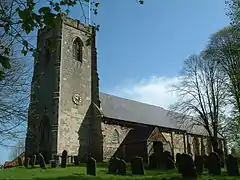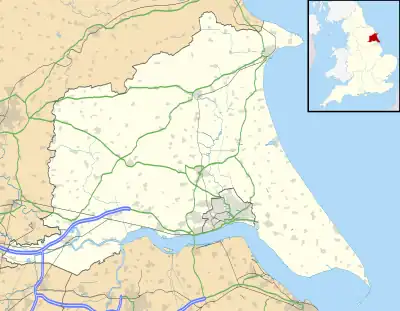| Kilham | |
|---|---|
 All Saints Church | |
 Kilham Location within the East Riding of Yorkshire | |
| Population | 1,088 (2011 census)[1] |
| OS grid reference | TA0664 |
| • London | 175 mi (282 km) S |
| Civil parish |
|
| Unitary authority | |
| Ceremonial county | |
| Region | |
| Country | England |
| Sovereign state | United Kingdom |
| Post town | DRIFFIELD |
| Postcode district | YO25 |
| Dialling code | 01262 |
| Police | Humberside |
| Fire | Humberside |
| Ambulance | Yorkshire |
| UK Parliament | |
Kilham is a village and civil parish in the East Riding of Yorkshire, England. It is situated about 5 miles (8 km) north-east of Driffield town centre. According to the 2011 UK census, Kilham parish had a population of 1,088,[1] an increase on the 2001 UK census figure of 1,010.[2]
History
Kilham lies on the line of a Roman road from York to Bridlington, now followed by the minor road known as Woldgate.[3] Pevsner notes that the village is more than a 1-mile (1.6 km) in length along this main street.[4] To the south of Kilham there is evidence of a Romano-British settlement from the 4th century.[5] The settlement is mentioned as Chillun in the Domesday Book, though without a population.[6] The name of the village derives from the Old English Cylnum, meaning at the kilns.[7]
Kilham, which lies in a narrow valley on the southern edge of the wolds, was once an important market town in the Yorkshire Wolds, bigger and more important than Driffield at one time.[8] It held annual trading fairs and had a large number of businesses and a considerable population. The town declined in size and status following the building of the Driffield Navigation, which took trade away from Kilham to nearby Driffield,[9] however, the village was already floundering in terms of trade long before the canal was cut.[10]
In 1823 Kilham civil parish was in the Wapentake of Dickering and the Liberty of St Peter's.[11] A market had previously been held on Thursdays. The parish church was under the patronage of the Dean of York.[12] A mineral spring near the road to Rudston was supposed curative for disorders. A further spring, called Henpit Hole, was near the road to Langtoft; during a wet autumn it would spout with "violence". A Methodist chapel was first built in 1789, and a Baptist chapel existed in the village by 1819.[13] The population at the time was 971.[14]
Occupations included twenty-two farmers, seven shoemakers, five grocers, three of whom were also drapers, four blacksmiths, four tailors, four bricklayers, three joiners, two butchers, two glove makers, a brick & tile maker, a draper, a bacon factor (wholesale tradesman), a plumber & glazier, a bookseller, a saddler, a fellmonger, a corn miller, a gardener & seedsman, and the landlords of the Royal Oak, Plough, Star, and Black Bull public houses. Within the parish were two surgeons, a schoolmaster, four gentlemen and two gentlewomen, a Baptist minister, a curate and a vicar, a yeoman, an Esquire, two Royal Navy masters and a Royal Navy lieutenant. Two carriers operated between the village and Driffield, Beverley, Hull, and Bridlington once a week.[15]
Community
Kilham's Grade I listed Anglican parish church is dedicated to All Saints.[16] The church holds an annual flower festival. Outside the church is a grade II listed tethering ring in a stone block – evidence of the cattle trade and bull-baiting which once took place in the village.[17][18] There is also a cast-iron water pump opposite the church.
At one time there were six schools in the village, but only one now remains, Kilham C. of E. primary school, which was rated as good by Ofsted in 2015.[19] In 1633, Lord John Darcy of Aston opened a grammar school in the village.[20] It was closed by 1880 when the site was redeveloped as a temperance hall.[21]
In 2010 the Kilham Playing Field Association opened a recreational playing field on Back Lane, to provide a full-sized football pitch, a 5-a-side football pitch, grass tennis courts, adventure playground and cycle track. The Association, a registered charity, has been funded locally and through the Big Lottery fund and Grassroots.[22]
Notable residents
- David Byas, the former Yorkshire cricket captain, is from Kilham.[23]
- Sir Benjamin Fonseca Outram, naval surgeon, was born in Kilham in 1770[24]
- Sir Henry Thompson, Lord Mayor of York (1663 & 1672), Deputy Lieutenant of the West Riding of Yorkshire (1665) and MP for York (1673–1873)[25] was born in Kilham.
References
- 1 2 UK Census (2011). "Local Area Report – Kilham Parish (1170211210)". Nomis. Office for National Statistics. Retrieved 21 February 2018.
- ↑ UK Census (2001). "Local Area Report – Kilham Parish (00FB081)". Nomis. Office for National Statistics. Retrieved 2 March 2020.
- ↑ Browne 1912, p. 33.
- ↑ Pevsner, Nikolaus; Neave, David; Neave, Susan (2005). Yorkshire - York and the East Riding. New Haven: Yale University Press. p. 575. ISBN 0300095937.
- ↑ "Heritage Gateway – Results Monument Number 910829". www.heritagegateway.org.uk. Retrieved 29 March 2021.
- ↑ "Kilham | Domesday Book". opendomesday.org. Retrieved 12 November 2023.
- ↑ Smith, A. H. (1970) [1937]. Place-names of East Riding of Yorkshire and York. Cambridge: Cambridge University Press. p. 97. ISBN 0-521-04907-5.
- ↑ Allison, Keith John (1976). The East Riding of Yorkshire Landscape. London: Hodder & Stoughton. p. 52. ISBN 0340158212.
- ↑ Purdy 1974, p. 247.
- ↑ Allison, Keith John (1976). The East Riding of Yorkshire Landscape. London: Hodder & Stoughton. p. 223. ISBN 0340158212.
- ↑ "Genuki: Kilham, Yorkshire (East Riding)". genuki.org.uk. Retrieved 12 November 2023.
- ↑ Purdy 1974, p. 259.
- ↑ Purdy 1974, p. 262.
- ↑ Page, William, ed. (1907). The Victoria history of the county of York. vol 3. London: Constable & Co. p. 489. OCLC 500092527.
- ↑ Baines, Edward (1823). History, Directory and Gazetteer of the County of York. pp. 359, 360.
- ↑ Historic England. "Church of All Saints (1309840)". National Heritage List for England. Retrieved 16 April 2012.
- ↑ Historic England. "Bull Ring (Grade II) (1162035)". National Heritage List for England. Retrieved 12 November 2023.
- ↑ Browne 1912, p. 178.
- ↑ "Kilham Church of England Voluntary Controlled School URN: 117980". reports.ofsted.gov.uk. 8 October 2020. Retrieved 12 November 2023.
- ↑ Browne 1912, p. 332.
- ↑ Purdy 1974, p. 251.
- ↑ "Kilham Playing Field Association - Prosiect | Cronfa Gymunedol y Loteri Genedlaethol". tnlcommunityfund.org.uk. Retrieved 13 November 2023.
- ↑ Searby, Martin (5 December 2002). "Byas quits again for life on farm". The Telegraph. Retrieved 29 March 2021.
- ↑ Browne 1912, p. 349.
- ↑ "Papers of Henry Thompson". Archived from the original on 20 July 2012. Retrieved 28 September 2006.
- Gazetteer — A–Z of Towns Villages and Hamlets. East Riding of Yorkshire Council. 2006. p. 7.
Sources
- Browne, Horace B. (1912). Kilham, East Riding of Yorkshire. London: A. Brown and Sons.
- Purdy, J. B. (1974). "Dickering Wapentake". In Pugh, R. B. (ed.). A History of Yorkshire East Riding volume II. London: Victoria Counties History. ISBN 0-19-722738-4.
External links
 Media related to Kilham at Wikimedia Commons
Media related to Kilham at Wikimedia Commons- Kilham in the Domesday Book
- History of Kilham – A Vision of Britain Through Time
- Driffield.co.uk – The Villages of the Yorkshire Wolds, Kilham.
- Genuki: Kilham Parish information from Pigot's 1834.
- Windmillworld – Kilham Windmill, East Yorkshire.
- KPFA – Kilham Playing Field Association
- KilhamSchool.co.uk – Kilham Church of England Primary School